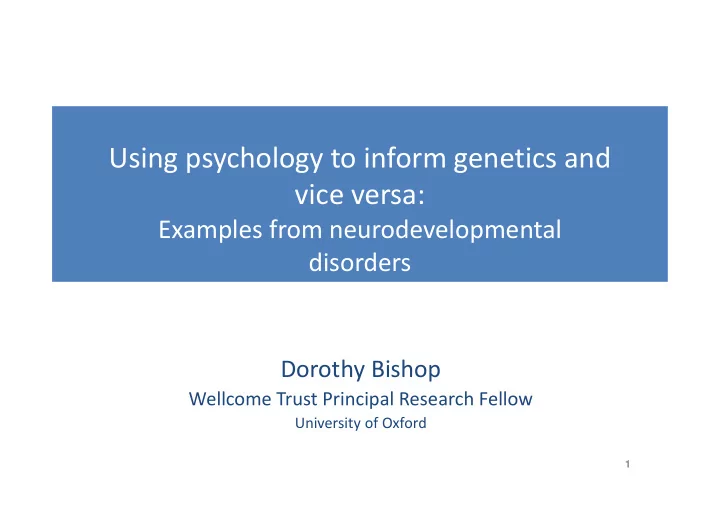

Using psychology to inform genetics and vice versa: Examples from neurodevelopmental disorders Dorothy Bishop Wellcome Trust Principal Research Fellow University of Oxford 1
Neurodevelopmental disorders of unknown origin Specific Language Impairment Dyslexia Autism Attention deficit Dyspraxia hyperactivity disorder
Neurodevelopmental disorders of unknown origin Specific Language Impairment ♦ Language does not follow normal developmental course – immature speech sounds/grammar ♦ No obvious explanation (e.g. hearing loss, physical abnormality, acquired brain damage) ♦ Normal development in other areas
http://news.bbc.co.uk/1/hi/education/2638889.stm Thursday, 9 January, 2003, 11:15 GMT Daily grunt parents hold children back Not enough talking going on Parents who do little more than grunt at their children every day are damaging their language development, a literacy expert has said. Alan Wells, director of the Basic Skills Agency, says parents no longer talk to their children and instead just let them sit in front of the television or computer for hours. 4
Twin Study Method Monozygotic (MZ) twins: genetically identical Dizygotic/Fraternal (DZ twins): share 50% of polymorphic genes Question: Is concordance for disorder higher in identical than in fraternal twins? 5
Status of co-twins of children diagnosed with specific language impairment Identical twins Fraternal twins handic Specific language impairment Low language History of therapy Low IQ Unaffected Bishop, D. V. M., North, T., & Donlan, C. (1995). Genetic basis of specific language impairment: evidence from a twin study. Developmental Medicine and Child Neurology, 37, 56-71.
Conclude…….. • Substantial genetic influence on SLI • But traditional definition of disorder does not “carve nature at its joints” • Need for better specification of phenotype – use theoretically informed measures 7
Some promising component skills • Auditory processing skills • Phonological short-term memory 8
One promising candidate skill: Auditory temporal processing Stimuli: 75 ms tones, high and low frequencies Child learns to press button 1 for high tone, and button 2 for low tone Then responds to tone sequences, varying in Rate of presentation • • Length of sequence Bishop, D. V. M., et al 1999. Different origin of auditory and phonological processing 9 problems in children with language impairment: evidence from a twin study, Journal of Speech, Language and Hearing Research 42: 155-168.
Another promising candidate skill: Phonological short-term memory Children’s Nonword Repetition Test Child listens to spoken nonwords and repeats, e.g. 2 syllables: hampent 3 syllables: dopelate 4 syllables: confrantually 5 syllables: pristoractional Gathercole, S. E., Willis, C., Baddeley, A. D., & Emslie, H. (1994). The children's test of nonword 10 repetition: a test of phonological working memory. Memory, 2, 103-127.
DeFries-Fulker (DF) analysis nonshared environment only shared environment only genes only Co-twin Fraternal Proband Co-twin Identical Proband -2 0 z-score
Auditory Repetition Test: DF analysis co-twin Fraternal proband co-twin Identical proband 2.0 -1.5 -1.0 -0.5 0.0 0.5 -2.. z-score
Nonword Repetition Test: DF analysis co-twin Fraternal proband co-twin Identical proband -2.5 -2.0 -1.5 -1.0 -0.5 0.0 0.5 -2.. z-score
Conclusions from twin studies Environmental Genetic risk factors Morphosyntax Auditory deficit Phonological deficit STM deficit Twins resemble each other MZ twins more regardless of similar to each phonological whether MZ other than DZ phonological STM deficit or DZ STM deficit 14
The bottom line • Traditional diagnostic categories do not identify aetiologically distinct conditions • We will get more coherent results from molecular genetic studies if we first use behaviour genetics to identify heritable phenotypes 15
Dorothy Bishop Oxford Study of Children’s Communication Impairments, Department of Experimental Psychology, South Parks Road, Oxford, OX1 3UD, England. http://psyweb.psy.ox.ac.uk/oscci/ Blog: http://deevybee.blogspot.co.uk/ 16
Recommend
More recommend